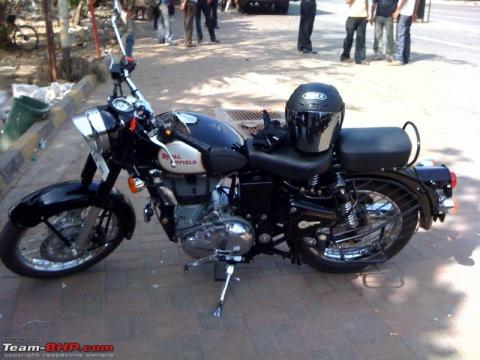It seems 15W-50 Motul 7100 or 300 V is generally the best. Shell Ultra also has good reviews.
BHPian 2wheelsvaga recently shared this with other enthusiasts.
I have been looking around to figure out which synthetic oil would work best with the Std 350 / Classic 350.
1) When do you recommend shifting to fully synthetic from the standard semi-synthetic oil provided by the RE service outlets?
I understand it’s a good idea to let the bike use regular oil for the first few 1000 kms or so.
Should one plan to shift to fully synthetic after the first year of ownership?
2) It seems 15W-50 Motul 7100 or 300 V is generally the best. Shell Ultra also has good reviews.
I’ve used Ultra years ago and would like to go back to using that brand. But I’d like to hear your experiences of using synthetic oils in the Bullets. Would you recommend Motul over all other brands?
My use scenario will involve some riding in typical metropolitan city conditions. Most of the riding will, however, be for touring purposes with maximum cruising speeds of 80 to 90 kmph (with pillion and luggage).
3) Should one expect any issues with the RE people if one shifts to a non RE fully synthentic engine oil while still in the (extended) warranty period?
Thanks!
Here’s what BHPian Jeroen had to say on the matter:
Stay with whatever Royal Enfield recommends. They have far more experience than the internet self proclaimed oil gurus.
Also, the internet although extremely outspoken on what oil to use, tends to have no research fasciliteert, speaks at best from personal experience and certainly won’t be available to help out if you suffer engine damage or additional wear due to a using a non manufacturer recommended oil.
If RE wants you to use a synthetic oil, it will specify which oil and when. Life is that simple!
Jeroen
Here’s what BHPian Roy.S had to say on the matter:
I own a Classic 500 and once I had to use fully synthetic oil because we were in a state of semi lockdown and there was no other option. The only difference was that the bike felt marginally quieter but there wasn’t any improvement otherwise. These ancient engines just don’t benefit from the expensive fully synthetic oils or any type of additive. Its akin to casting pearls at a swine.
OP asked a specific set of questions and some of them were answered. Perhaps the answers were not what was expected but not everything needs discussion and pontification.
I do use fully synthetic in my cars (Swift and I20) and the difference is palpable. I think higher end cars come filled with fully synthetic from the factory. I could be wrong here, though.
Here’s what BHPian Gansan had to say on the matter:
Synthetic oils for older generation vehicles may not help much, but will not hurt. Provided one does not mind the cost. It will be like feeding a race horse diet to a mule, more or less! But it is our mule, our decision!
Stick to whatever oil RE workshop provides till the warranty period is over. After that it is your call. Just ensure the oil spec mentioned in the owner’s manual is matched, whether the oil is synthetic/semi synthetic/mineral.
Here’s what BHPian hserus had to say on the matter:
API SL isn’t as relevant as the JASO MA for a wet clutch bike’s oil. There is no mention of fully or semi synthetic, or mineral here. As long as you use a 15w50 oil compatible with JASO MA or successor specification, you should be fine. It is perfectly fine to have API SL for the higher phosphorus content in the oil (.1% rather than .08 or lower for successor specifications) given the vintage of this particular engine. And yes a Xw50 oil, whether that is 10,15 or 20 at the lower end of this range is only going to matter if the bike is taken to somewhere the temperature falls below -20 or so C.
There is no manufacturer specific spec here like BMW, Ford or many other manufacturers have for there to be any significant change or difference from using one brand or the other that matches an industry wide spec for wet clutch motorcycles.
Read BHPian comments for more insights and information.
Source: Read Full Article
